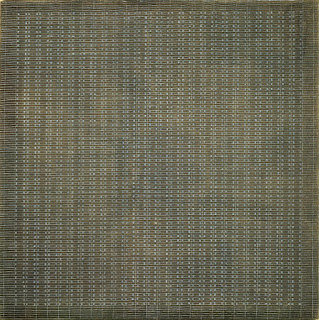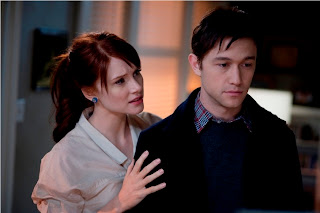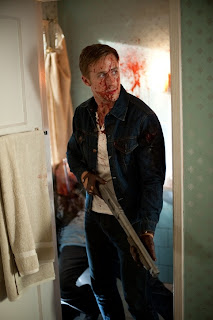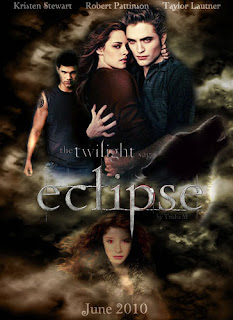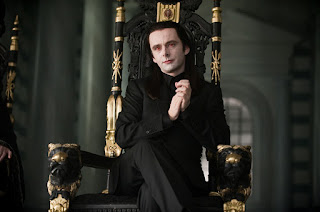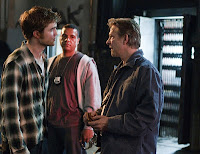
The
Foucauldian grid of power/knowledge/capital is the matrix that Georges Duroy exists in. All the reviews judge him a scoundrel, rotten, a terrible person who seduces, sleeps and fucks his way to the top. But what else is new. Ambitious men do not marry waitresses. Usually. Or hardware store clerks, do they? And don't women gauge men that they plan to marry as furthering their position in life? Being a good provider for them and their children?
As Glenda Jackson says in Sunday, Bloody Sunday, "doesn't marriage always get down to property?" Why does Georges Duroy draw such condemnation as a character.
I read a few English translations, mostly early ones. He felt insecure and lost in the beginning, while trying to present himself as a normal person in Paris. He meets an old military acquaintance on the street. They have been acquaintances, not comrades and not even good friends, but Duroy is accused of betraying his friend who helped him get a start. If you read the book it is clear that Forestier had plans to use Duroy for his benefit at the newspaper as well as giving him a start. It is not difficult to see that someone you know, somewhat who is in need of some advice and guidance, and who might be of use, could generate an impulse of kindness in you to help out. As long as it is not going to inconvenience you too much and as long as there stands a possible future benefit to you. Forestier quickly cools off the second time Duroy asks for help and Duroy backs off.
He simply is attracted to women and they to him. He intuits what they want to hear and desires to please them. He has few social graces and those are mostly copied from watching others. He is a rural rube who went into the military. Know anyone like him now?
His first women are prostitutes, and his first real woman is Madame Marelle. She is from Bohemia. For an understanding of immigrants from Bohemia in the early to middle 19th century read
Willa Cather's My Antonia
The writer as a child has a beloved playmate who is a young child of cultured but struggling parents from Bohemia. She is an alive spirit as is Clo, full of spontaneous curiosity and emotional changes.
So Georges has an affair with Clo, married to an old man who is away a lot and who probably doesn't mind as long as it is not thrown in his face. Clo wants to go out and be seen with him and he spends all his money on her until he doesn't have any anymore. Then she begins to slip money in his pocket to help him so she can continue to see him. (Later he gives her the financial tip that will get her 70,000.
Nice payback, eh?)
He feels reluctant but acquiesces quickly.
What is so wrong about this? Unless you yourself are a petit bourgeois, and then of course you will judge him for this.
Forestier's wife encourages him to see her, helps him with an article or two to get him started and he begins to learn journalism the way it is practiced at a successful newspaper. Assert while suggesting the opposite. Oppose while suggesting otherwise.
Any different today? This is wrong?
When Forestier's sickness worsens and he goes away with his wife to hopefully recover-but really to die- Madeleine asks Georges to come and stay with her. He does. Forestier dies. And he sees his chance to marry a woman he has long admired for her wit, her intelligence, her ambitious nature, and because he is sexually attracted to her. He proposes right away in a very careful and seductive way to her as he knows he must make his intentions clear immediately before someone else does.
This makes him a bad person?
They spend their wedding night on a train and Georges is amorous. He has no social experience at all as to how he should conduct himself. Men are supposed to be attentive and amorous, aren't they, just after they are married-on their wedding night? He pushes, is rebuffed, pushes some more and in one of the English translations it skipped to the next morning, in another it said they copulated, so I went to the French original:
un accouplement violent et maladroit which is pretty clear.
It's a clumsy, violent quickie. LIke he might might have rolled a peasant girl at home in the fields. And Madeleine clearly expected more in a nicer place and didn't get it and she makes him pay for insulting her that way. She is never warm and passionate with him again, and even indicates its OK with her when he takes up again with Clo and seduces him into seducing Mme Walter.
This is his fault completely?
Victims? This is an insult to these accomplished, beautifully dressed married women.
He plays his seduction game with Mme Walter and she falls fast for him being married to another clumsy man, with two young girls, and craving something else.
Not to go there too far but why is this so terrible except for the fact that she bores him very quickly and he can't figure out a way to get out of it smoothly as he doesn't possess the social graces necessary for that? He sees that if he hadn't been married he could have married the young daughter he has so much fun with. But if he hadn't been married he wouldn't have the veneer of varnish on him he now has, nor the money he now has from the death of Madeleine's "friend". He has learned how to negotiate from his wife - to play poker -
and I suppose people want to blame him for that too?
He finds out through Mme Walter, who confides in him that her husband - his editor and owner of the newspaper_ - have used his writing to cover up a big government money deal that will make them filthy rich.
Just not Georges. No loyalty there at all. Does he owe them devotion? Or honesty? Or anything else? He is confined in the
Foucauldian matrix, the Foucauldian Grid, and he is surviving by allowing Destiny to offer him chances, windows of opportunity, doors to go through, that he takes. He learns journalism, or how it must be practiced to continue working and moving ahead career wise. I
s this any different from 99% of career hungry people today? It may not be an example of integrity, but how many people do you know that would sacrifice their upward mobility just to do the right thing?
Count them on a few fingers, would you please.
He perceives at Walter's big open house celebration that his wife is overly friendly with one of the men in on the big financial deal. He is wishing he were not married so he could marry Suzanne, the young, now very wealthy daughter of his employer and editor and husband of his ex-lover, whom he enjoys being with.
This is complicated, but is it bad? Is he a snake or a swine because of this? What has he really done so far?
HIs wife Madeleine has taken his affection and thrown it away. I grant you it wasn't a great passion, but it was affection. She has betrayed him and now is deceiving him with this government official who got a power position because of the copy George wrote about the African colonies and Tunisia government debt.
Everyone got something out of this but Georges and now he is being cuckolded.
Georges enters the parallel universe of
Symbolic Exchange and Death. His wife has given him a
"gift" and he must return the
"counter-gift",
which must be greater than the gift received, or he must suicide. (Baudrillard looks at 9-11 in this way also. The US has not returned the counter-gift and has no way of doing so.) Not necessarily die, but become a passive partner of his wife like his predecessor Forestier, which is a suicide. He returns the "counter-gift", divorces his wife, ruins her lover, and plans a runaway strategy to capture the young daughter who already adores him.
This is diabolical in an evil way? She should marry an effete title instead? And he has learned not to rush the sex this time.
Her father, his employer Walter, tells his wife that he is going to marry Suzanne over her furious protests, and thinks it might not turn out too bad as Georges has shown great intelligence and ingenuity.
And he is dangerous. Georges has entered the Order of Production and Exchange and has willed his strategy for success. Why is he seen as a cad who mistreats women and ends up with it all?
Are all these women victims? I don't think so. I think they are full participants.

And I wish fans and reviewers and Rob Pattinson would stop wading into the psychological swamp of interpretation.
On the first page Georges is worrying:
He regretted that he had not remained where he was;but he had hoped to improve his condition--and for that reason he was in Paris!
So here beats the heart of a petit bourgeois who wants to make it in Paris and leave his peasant origins behind. Kind of like a female Bovary and de Maupassant was a disciple of Flaubert. Understandable.
And then one of the finest examples of Marxian class struggle I have ever read. Georges takes Madeleine to his family's tavern following their wedding train trip, at Madeleine's insistence of course, and she is appalled at his family background. He is happy to see them and unashamed, although he understands why it would be difficult for her and agrees to leave when he sees she is uncomfortable.
Mother Duroy did not speak, but remained sad and glum, watching her daughter-in-law out of the corner of her eye, with hatred awakened in her heart__the hatred of an old toiler, an old rustic with fingers worn and limbs bent by hard work__for this lady, who inspired her with the repulsion of an accursed creature, an impure being, created for idleness and sin. (65 words)
The hatred women have for one another is here. The complete antipathy and irreconcilable hatred of class differences and class struggle can be felt in a way Marx could never have expressed it in all his pages. The terrible
Inscription of the Body Foucault, Nietzsche, Deleuze and Baudrillard describe is all here in 65 words. The slyness out of the corner of her eyes, her rigidity, and not least, her terrible hatred. Brilliant.
Measures 80" by 140" almost 7 ft by almost 12 feet showing a mother harnessed with her young daughter behind her, taken from a 1920 photo before Chairman Mao changed all this. It hangs at the Kemper Contemporary Museum in Kansas City on the right as you come in the door. It is huge. The
horror that you don't see in this image is the other pair in this diptych following, just as huge with an image of a barge being pulled in a canal in China by this same mother and her daughter, who is learning very young to inscribe her body for backbreaking - literally - labor. And this is during the same time period that young girls are still being tortured by having their feet bound to be idle ladies. And while the US is supporting Chiang Kai Shek.
Is there one of the judges who has a better plan for him? One where he could have remained other than one of the bumbling older men we see in this novel? Is he any different from us? From Rob Pattinson who must make his compromises with his harassing fandom, his employer Scummit, the Hollywood machine?  Clooney
Clooney is handsome and idealistically sincere. His idealism is real and it begins to show cracks before we see the break. As his idealism turns into cynicism his facial mask becomes that of a liar.
is handsome and idealistically sincere. His idealism is real and it begins to show cracks before we see the break. As his idealism turns into cynicism his facial mask becomes that of a liar.  Foucault spent his life giving us the genealogy of power in the way it fuses and is always in a functional relation with knowledge. Power/Knowledge is fused, melded, inseparable. Power is in a functional relation with Knowledge. Power is not something someone has, a government has, a president has, or a person can have. It does not oppress us from the top down, contrary to our perception, our belief, our unquestioning understanding. Power is not something someone has or does not have, something someone gives you or takes from you. One person can dominate another, but that is not power, and it can shift at any time.
Foucault spent his life giving us the genealogy of power in the way it fuses and is always in a functional relation with knowledge. Power/Knowledge is fused, melded, inseparable. Power is in a functional relation with Knowledge. Power is not something someone has, a government has, a president has, or a person can have. It does not oppress us from the top down, contrary to our perception, our belief, our unquestioning understanding. Power is not something someone has or does not have, something someone gives you or takes from you. One person can dominate another, but that is not power, and it can shift at any time.